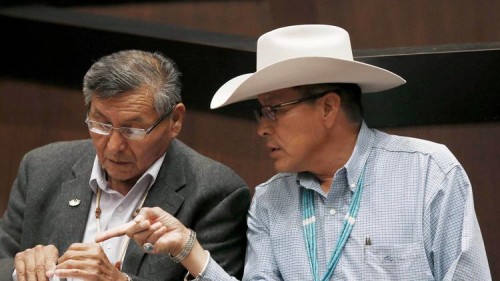
By Cindy Carcamo, Los Angeles Times
In a historic settlement, the federal government will pay the Navajo Nation more than half a billion dollars to settle claims that it mismanaged reservation funds for more than 60 years, the tribe and the government announced Wednesday.
At $554 million, the settlement is the largest obtained by a single American Indian tribe against the U.S. It caps a drawn-out dispute filed in 2006 with the U.S. Court of Federal Claims.
The settlement goes a long way toward repairing some of the “wrongs that have been done against the Navajo people,” said Rick Abasta, a spokesman for the Navajo Nation.
But it also serves a more practical purpose, he said.
“It’s a great opportunity to address some of the disparities that exist in the [Navajo] Nation,” he said. “This $554 million is like a much-needed cash infusion for the nation.”
The Navajo Nation is the largest Native American tribe, with more than 300,000 members and a reservation that spans 27,000 square miles in three states, Utah, Arizona and New Mexico. But some tribal members who live in remote areas lack modern amenities — even electricity and running water.
“This landmark resolution ends protracted and burdensome litigation. It will provide important resources to the Navajo Nation. And it fairly and honorably resolves a legal conflict over the accounting and management of tribal resources,” U.S. Atty. Gen. Eric H. Holder Jr. said in a statement.
Abasta said Navajo Nation President Ben Shelly planned to hold a series of town hall meetings to hear from tribal members as to what should be done with the money.
The lawsuit alleged that from 1946 to 2012, the U.S. government, which served as trustee for the tribe’s natural resources, did not negotiate appropriate deals with entities that were extracting natural resources such as coal, uranium, oil and gas from the Navajo reservation.
In addition, the tribe contended that the U.S. did not properly monitor royalties to ensure that the tribe was appropriately paid. It also contended that the U.S. did not properly invest the proceeds to ensure that the tribe would receive an appropriate return on its money.
The lawsuit, which sought $900 million, did not go to trial. Instead the Obama administration decided to settle out of court, said Andrew L. Sandler, who represented the tribe with partner Samuel J. Buffone.
“There was a lot of government misconduct for a very long time, but the Obama administration and Justice Department stepped up and did the right thing in this case,” Sandler said.
The settlement was negotiated in June and finalized by senior Navajo and U.S. officials in early August, Sandler said. The U.S. has agreed to pay the settlement in the next 30 to 60 days.
About 100 similar cases have been filed by other tribes, Sandler said; many have been settled, but a few remain in litigation. The second-largest single settlement was for $380 million, with the Osage tribe in Oklahoma. The 2011 deal ended 11 years of litigation over claims of mismanagement of tribal assets.
The Navajo Nation plans to host a signing ceremony in Window Rock, Ariz., where administration officials will join tribal members to complete the settlement Friday.
“The trust litigation has been a protracted battle and, in the end, it was a victory for tribal sovereignty,” Shelly, the Navajo Nation president, said in a statement. “After a long, hard-won process, I am pleased that we have finally come to a resolution on this matter to receive fair and just compensation for Navajo Nation.”


